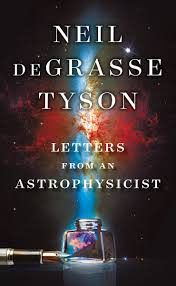I have long been a fan of Neil deGrasse Tyson, currently America’s best explainer of all things scientific. When I interviewed him in 2017, I mentioned how happy I was to have seen him do an appearance before 3,000 people who all went to see and hear him discuss the stars, dark matter, space exploration, and much more. At the time, he was promoting his book, “Astrophysics For People In A Hurry,” which became a #1 bestseller.
Now, Tyson is back in print with “Letters From An Astrophysicist,” which contains his replies to people who have written to him, as well as correspondence he’s written to NASA, his heartfelt eulogy for his father, and his thoughts after watching the World Trade Center fall on 9/11/01.
My favorite parts of the book are where he’s in debunking mode about the unreliability of eyewitness testimony, the absurdity of psychic teleportation, Bigfoot, and aliens. I got a great kick out of his reply to a man who thinks scientists and corporations are suppressing the discovery of perpetual motion machines:
Dear Shawn,
The US Patent and Trademark Office no longer accepts proposals for perpetual motion machines without a working model to demonstrate the invention. Why? Perpetual Motion machines violate long-established and well-tested laws of physics.
So, if you have an idea for one, you can realistically expect any scientifically educated person to give it attention.
This leaves you with one, and only one option: to build it and demonstrate it. If a machine works as you say, then people will beat a path to your door.
Not willing to give up, Shawn thought that Tyson was being stubbornly closed-minded, which brought this response:
The history of scientific discovery tells us that your quest is misguided, so the burden of proof is 100% on your shoulders.
Don’t let me stop you. Like I said, go ahead and build the thing. If you succeed, you will have demonstrated a heretofore unknown law of physics. These are rare, but always welcome on the scene. And you will become rich and famous overnight.
The demand for evidence is a recurring theme throughout Tyson’s book. Claims are not worth anything until they are backed up by proof, which itself must be reviewed by peers who can reproduce it. That’s how we come to a scientific consensus, not by believing conspiracy theories that offer nothing more than denial — or a supernatural or religious explanation for phenomena they do not understand.
I also enjoyed the way Tyson declined an invitation to appear on “Finding Your Roots,” the Henry Louis Gates PBS genealogy series:
I have an unorthodox philosophy regarding root-finding. I just don’t care. And that’s not a passive absence of caring, it’s an active absence of caring. Since any two people in the world have a common ancestor — depending on how far back you look — the line we draw to establish family lineage is entirely arbitrary….
I don’t care if I am a descendant of kings or paupers, saints or sinners, the brave or cowardly. My life is what I make of it.
What a refreshingly humanist perspective, which shouldn’t be surprising considering its source. In that, and so many other things he’s spoken and written — including the way he’s made science more palatable for a mass audience of undereducated people like me — Tyson has my respect and appreciation.
“Letters From An Astrophysicist” is a great read from a great communicator.

